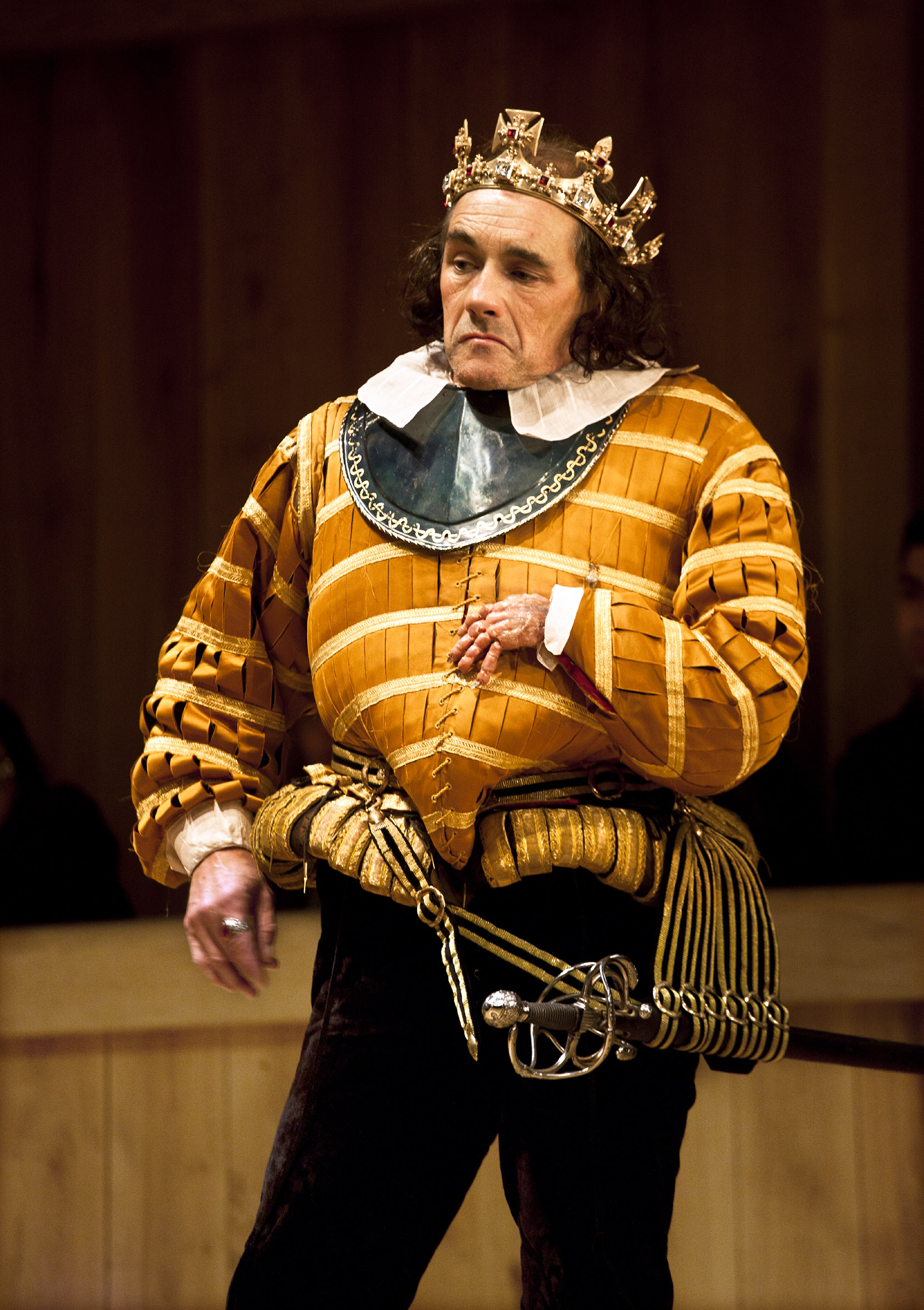Jerusalem, Apollo Theatre | reviews, news & interviews
Jerusalem, Apollo Theatre
Jerusalem, Apollo Theatre
Triumphant transfer of Jez Butterworth’s smash hit pastoral play

Looking at posters outside the Apollo Theatre, where the West End transfer of Jez Butterworth’s award-heavy Royal Court success opened last night, you might be tempted to start humming: “And did those feet in ancient time…” But such nostalgic sentiments are unlikely to survive the opening scene of this phenomenal play. Soon after the curtain, a symbolically faded flag of St George, rises, we see a familiar rural scene: under-aged kids stoned out of their minds, dancing in a thumping rave.
Yes, we are Chez Johnny Rooster Byron. This ex-daredevil stunt driver has made his home in a decaying metal caravan deep in the forest somewhere in Wessex. A contemporary freeborn Englishman, Rooster is a roaring mix of skiving wastrel and Pied Piper. As he doles out booze, drugs and tall tales to a group of hangers-on, which include Ginger, Lee and Davey, as well as some 15-year-olds, this larger-than-life figure is a hippie anarchist who seems to be directly plugged into an olde myth of Trad England, rural, pagan and blitzed.
Brilliantly embodied by Mark Rylance, Rooster is a rasping, hissing, roaring Falstaffian fantasist, an overgrown teen who is gradually revealed to have some deeply unattractive features. He is an absent father, incompetent male and has a suspicious liking for very young girls. As the master of revels in this Deep England, Rylance is a mesmerising stage presence who begins the play by doing a somersault, dipping his head into a water trough and then downing a mixture of raw egg, milk, speed and vodka. Well, I suppose it’s one way of curing a hangover.
Constantly amazing, and always hypnotic, Rylance bestrides the play, and its landscape of wild imaginings, like a colossus. Eloquent in his harangues, generous in his hospitality, inscrutably individual and heartbreakingly lonesome, this is an eccentric character who mixes tender nostalgia, puckish defiance and sheer disputatious, disrespectful joyousness. Even on a bad day. His final scene, in which he appears as a crazed wolf howling in a lonely wood, will stay with me for ever.
Set on St George’s Day, this state-of-the-nation pastoral describes what happens when the local council tries to evict Rooster from his mobile home. In fact, he doesn’t have a chance against the modern world, represented here by bureaucratically tedious Kennet and Avon council officials. Of course, in political terms, Butterworth’s text sails dangerously close to kinship with those reactionary columnists, such as Richard Littlejohn, who complain about any legislation with interferes with their right to do as they please. But the humour, bravado and sheer excess of Butterworth’s vision soon wipes out most doubts.
As the play’s title reminds us, this three-hour lament for a freewheeling England whose time is up is resonant with a powerful sense of loss. Directed with enormous sensitivity by Ian Rickson, Butterworth’s writing is like a gnarled tree, with twisted stories branching out all over the place, twigs snapping under the weight of odd emotions and the occasional fruit popping up where least expected. Rooster’s stories of pub brawls, wild parties, underage sex, an absurd virgin birth and an ancient giant combine with hymns of praise to the forest, and to summer.
Not much occurs during the play. Butterworth’s writing exploits the extreme contrast, so typical of modern theatre, between what happens offstage and what doesn’t happen onstage. As reports arrive of the imminent eviction, a missing under-age girl called Phaedra and the now commercialized and sanitized Flintock Fair, what we get is a deeper and deeper understanding of who Rooster really is. The ne’er-do-well emerges as a much more troubled individual than we first thought.
The other characters are equally, and hilariously, eccentric: Ginger, played by Mackenzie Crook, is a lanky loser; Lee (Tom Brooke) is a gormless lad on the eve of emigrating to Australia; and Davey (Danny Kirrane) is a parochial abattoir worker. Along with these, there's Wesley (Gerard Horan), a sad pub landlord, and the mind-addled Professor (Alan David). They are all vividly drawn individuals, Rooster’s court of acolytes. At the end of an evening rich in jaw-dropping stories, ribtickling encounters and heady visions of Olde England, Butterworth and Rylance have no trouble in convincing you that Jerusalemis one of the best new plays of the decade
MARK RYLANCE’S BIGGEST HITS ON STAGE AND SCREEN
Bridge of Spies. Spielberg's warm-hearted Cold War thriller is lit up by Tom Hanks and Mark Rylance
Endgame. In Complicite's homage to Beckett, Rylance's Hamm is an animated, self-lacerating lout
 Farinelli and the King. A witty and moving new play is a timely reminder of just why art matters
Farinelli and the King. A witty and moving new play is a timely reminder of just why art matters
Jerusalem. Rylance is unforgettable as Johnny Rooster Byron in Jez Butterworth’s smash Royal Court hit
The BFG. Rylance lends moments of the sublime to standard issue Spielberg
La Bête. Rylance dazzles in astonishing opening monologue, but this callow play coasts on the performances
Nice Fish. Rylance is waiting for cod-ot in this absurdist West End trifle
Twelfth Night/Richard III. Rylance doubles up as Olivia and the hunchbacked king (pictured above) for Shakespeare's Globe
Wolf Hall. Mark Rylance works rare marvels as Hilary Mantel's scheming Tudor fixer
PLUS ONE TURKEY
Much Ado About Nothing. Rylance Old Vic staging of Shakespeare's romantic comedy with elderly leads gets lost in translation
.
Add comment
The future of Arts Journalism
You can stop theartsdesk.com closing!
We urgently need financing to survive. Our fundraising drive has thus far raised £49,000 but we need to reach £100,000 or we will be forced to close. Please contribute here: https://gofund.me/c3f6033d
And if you can forward this information to anyone who might assist, we’d be grateful.

Subscribe to theartsdesk.com
Thank you for continuing to read our work on theartsdesk.com. For unlimited access to every article in its entirety, including our archive of more than 15,000 pieces, we're asking for £5 per month or £40 per year. We feel it's a very good deal, and hope you do too.
To take a subscription now simply click here.
And if you're looking for that extra gift for a friend or family member, why not treat them to a theartsdesk.com gift subscription?
more Theatre
 The Line of Beauty, Almeida Theatre review - the 80s revisited in theatrically ravishing form
Alan Hollinghurst novel is cunningly filleted, very finely acted
The Line of Beauty, Almeida Theatre review - the 80s revisited in theatrically ravishing form
Alan Hollinghurst novel is cunningly filleted, very finely acted
 Wendy & Peter Pan, Barbican Theatre review - mixed bag of panto and comic play, turned up to 11
The RSC adaptation is aimed at children, though all will thrill to its spectacle
Wendy & Peter Pan, Barbican Theatre review - mixed bag of panto and comic play, turned up to 11
The RSC adaptation is aimed at children, though all will thrill to its spectacle
 Hedda, Orange Tree Theatre review - a monument reimagined, perhaps even improved
Scandinavian masterpiece transplanted into a London reeling from the ravages of war
Hedda, Orange Tree Theatre review - a monument reimagined, perhaps even improved
Scandinavian masterpiece transplanted into a London reeling from the ravages of war
 The Assembled Parties, Hampstead review - a rarity, a well-made play delivered straight
Witty but poignant tribute to the strength of family ties as all around disintegrates
The Assembled Parties, Hampstead review - a rarity, a well-made play delivered straight
Witty but poignant tribute to the strength of family ties as all around disintegrates
 Mary Page Marlowe, Old Vic review - a starry portrait of a splintered life
Tracy Letts's Off Broadway play makes a shimmeringly powerful London debut
Mary Page Marlowe, Old Vic review - a starry portrait of a splintered life
Tracy Letts's Off Broadway play makes a shimmeringly powerful London debut
 Little Brother, Soho Theatre review - light, bright but emotionally true
This Verity Bargate Award-winning dramedy is entertaining as well as thought provoking
Little Brother, Soho Theatre review - light, bright but emotionally true
This Verity Bargate Award-winning dramedy is entertaining as well as thought provoking
 The Unbelievers, Royal Court Theatre - grimly compelling, powerfully performed
Nick Payne's new play is amongst his best
The Unbelievers, Royal Court Theatre - grimly compelling, powerfully performed
Nick Payne's new play is amongst his best
 The Maids, Donmar Warehouse review - vibrant cast lost in a spectacular-looking fever dream
Kip Williams revises Genet, with little gained in the update except eye-popping visuals
The Maids, Donmar Warehouse review - vibrant cast lost in a spectacular-looking fever dream
Kip Williams revises Genet, with little gained in the update except eye-popping visuals
 Ragdoll, Jermyn Street Theatre review - compelling and emotionally truthful
Katherine Moar returns with a Patty Hearst-inspired follow up to her debut hit 'Farm Hall'
Ragdoll, Jermyn Street Theatre review - compelling and emotionally truthful
Katherine Moar returns with a Patty Hearst-inspired follow up to her debut hit 'Farm Hall'
 Troilus and Cressida, Globe Theatre review - a 'problem play' with added problems
Raucous and carnivalesque, but also ugly and incomprehensible
Troilus and Cressida, Globe Theatre review - a 'problem play' with added problems
Raucous and carnivalesque, but also ugly and incomprehensible
 Clarkston, Trafalgar Theatre review - two lads on a road to nowhere
Netflix star, Joe Locke, is the selling point of a production that needs one
Clarkston, Trafalgar Theatre review - two lads on a road to nowhere
Netflix star, Joe Locke, is the selling point of a production that needs one
 Ghost Stories, Peacock Theatre review - spirited staging but short on scares
Impressive spectacle saves an ageing show in an unsuitable venue
Ghost Stories, Peacock Theatre review - spirited staging but short on scares
Impressive spectacle saves an ageing show in an unsuitable venue

Comments
...
...